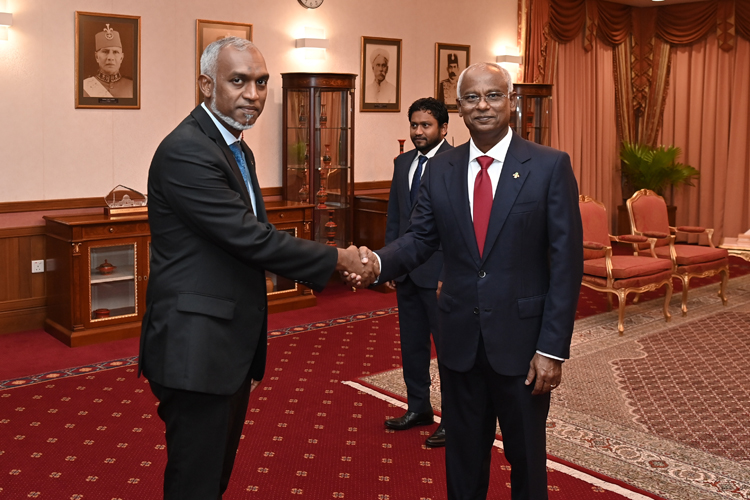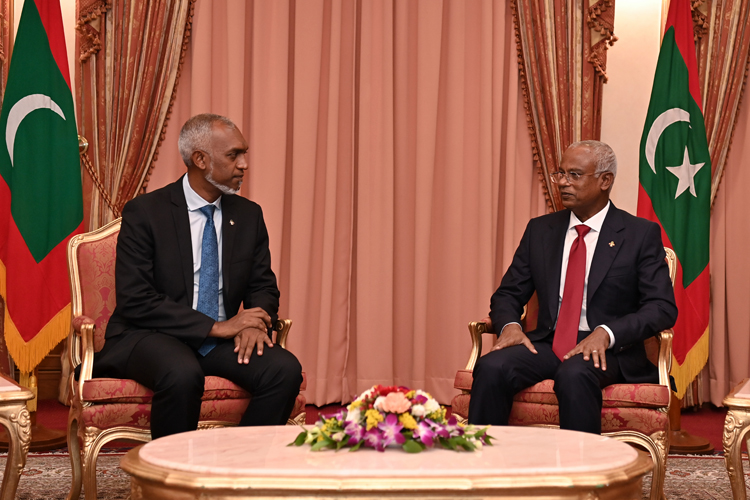INDIAN ARMED FORCES CHIEFS ON OUR RELENTLESS AND FOCUSED PUBLISHING EFFORTS

The insightful articles, inspiring narrations and analytical perspectives presented by the Editorial Team, establish an alluring connect with the reader. My compliments and best wishes to SP Guide Publications.

"Over the past 60 years, the growth of SP Guide Publications has mirrored the rising stature of Indian Navy. Its well-researched and informative magazines on Defence and Aerospace sector have served to shape an educated opinion of our military personnel, policy makers and the public alike. I wish SP's Publication team continued success, fair winds and following seas in all future endeavour!"

Since, its inception in 1964, SP Guide Publications has consistently demonstrated commitment to high-quality journalism in the aerospace and defence sectors, earning a well-deserved reputation as Asia's largest media house in this domain. I wish SP Guide Publications continued success in its pursuit of excellence.
Change of Guard in Maldives
Shifting Tides in the Indian Ocean as Maldives elects Pro-China President and navigates a new course
 |
The Author is Former Director General of Information Systems and A Special Forces Veteran, Indian Army |

Pro-China Dr Mohamed Muizzu has been elected as the new President of Maldives. In 2022, Muizzu told Chinese Communist Party officials last year that his party's return to office would "script a further chapter of strong ties between our two countries". On October 2, 2023, China congratulated Muizzu for his victory. China's foreign ministry issued a statement saying, "China is willing to work with the Maldives to consolidate the traditional friendship, deepen mutually beneficial cooperation and push for continuous new progress that would take place in the future-oriented comprehensive friendly cooperative partnership between the two countries".
Muizzu contested the election as a candidate of the Progressive Party of Maldives (PPM) and People's National Congress (PNC) coalition whose leader former president Abdulla Yameen Abdul Gayyoom is undergoing an 11-year sentence for corruption. As president, Abdulla Yameen was unabashedly pro-China. Immediately on being elected, Muizzu had Yameen shifted from prison to house arrest and can be expected to work for lifting his balanced sentence.
Dr. Mohamed Muizzu's election as Maldives' new President marks a pivotal shift in the nation's geopolitical stance, with pro-China sentiments taking center stage
Muizzu did his Master's in Structural Engineering from the University of London and obtained a PhD in Civil Engineering from the University of Leeds. He began his political career in 2012 as Minister of Housing and Environment under President Waheed and continued in the same appointment under President Abdulla Yameen, which was renamed as the Ministry of Housing and Infrastructure. He oversaw several infrastructure projects including the 1.39 km 'Sinamale Bridge' (China-Maldives Friendship Bridge) connecting the capital city, Malé, to the Velana International Airport in Hulhulé and extending further to the planned new city of Hulhumalé. In 2019, Muizzu became Vice President of PPM and in 2021 the Mayor of Male.
The factors for President Mohamed Solih losing the contest reportedly were failure to check corruption, a lackadaisical approach to infrastructure projects, and his differences with former president Mohammed Nasheed who broke away from the ruling Maldivian Democratic Party (MDP) to form his own political party. But anti-India propaganda apparently was another factor that helped the PPM and PNC coalition to win the contest.
In his election speeches, Muizzu did criticise India but not directly. He kept blaming the Solih government for decisions taken "by a foreign power" and that he would "counteract threats to Maldives' independence from the policies of the Solih government." In effect, Muizzu accused Solih of undermining Maldives' independence and sovereignty by seeking India's endorsement in making decisions. He even went to the extent of saying that "the protection of the country's independence should get priority over development projects." In other words, no development project should be at the cost of the country's sovereign rights.
Muizzu's strategic infrastructure projects, including the 'Sinamale Bridge', have not only transformed Maldives' connectivity but also strengthened ties with China, underlining his pro-China approach
In 2018, India had announced $1.4 billion worth of assistance for Maldives in community and development projects, including the flagship Greater Male connectivity project. Muizzu has said his government will not block development projects which are in the public interest but the defence and security partnership. Muizzu has said that the presence of foreign troops even for civilian purposes will not be tolerated.
As the President, Yameen had asked India to remove its naval helicopters and personnel, positioned to evacuate the sick from distant islands in the archipelago from Maldives. Muizzu is doing the same. He would naturally not criticise Yameen's wholly pro-China policy nor acknowledge that all Chinese projects abroad have a complement of regular PLA personnel and are completely PLA-owned – so much for his comment about not tolerating foreign troops in Maldives for civilian purposes.

India's defence cooperation with Maldives includes joint exercises, maritime domain awareness, gifting of hardware to Maldives and infrastructure development as mentioned above. India is also helping Maldives with a Coastal Radar System (CRS) and construction of a new defence ministry headquarters.
Prime Minister Narendra Modi has congratulated Dr Mohamed Muizzu on his election victory and re-affirmed India's commitment to strengthening its relations with Maldives. Muizzu has said his broad foreign policy strategy would centre on "fostering strong and balanced relationships with friendly nations while preserving the Maldives' interests", he also expressed his commitment to avoiding discrimination against any nation. But looking at the Muizzuuttering's and his close relationship with Yameen, China's writ is likely to run for the next five years under President Muizzu. Maldives may tone down India-Maldives defence cooperation with a corresponding increase in China-Maldives defence relations.
The electoral victory comes amidst growing concerns over India-Maldives defence cooperation, as Muizzu emphasises a balanced foreign policy affirming commitment to Maldives' interests
Located about 600 km off the southwest coast of India and 750 km southwest of Sri Lanka, Maldives consists of a double chain of 26 atolls spread over 90,000 sq km of territory. It has over 1,000 islands that are uninhabited and the country appears to be radicalising at a fast pace. Its geostrategic value lies in its location astride three of the most important SLOCs through which most of India's trade and oil requirements pass, apart from its close proximity to India and Sri Lanka.
India views Maldives as integral to its overall defence strategy. Close contact and coordination between India and Maldives in defence and security are vital for the peace and stability of the entire region in the backdrop of trans-national crime, terrorism, and drug trafficking in the Indian Ocean. But China has different designs, which is apparent from the Chinese military presence in Gwadar and Hambantota, and even in the Chittagong Port of Bangladesh under the pretext of training and maintenance of the two submarines gifted by China to Bangladesh.
China has always planned a "transshipment" port in Maldives, which is a euphemism to establish a naval presence in the archipelago. Deteriorated India-China relations since the 2020 Chinese aggression in eastern Ladakh and the continuing standoff of over three years along the entire Line of Actual Control (LAC), would encourage China to increase its influence in Maldives.
Muizzu's Presidency prompts a critical reevaluation of India's neighbourhood-first policy and underscores the need for nuanced foreign policy approaches
China's 'hold' on Maldives is the debt Maldives owes to China as well as a large number of Chinese tourists visiting Maldives. Tourism makes a large contribution to the economy of Maldives. In the overall context, according to the statistics Ministry of Finance of Maldives published on June 5, 2022, the Solih administration has taken a total of MVR 37 billion ($2.4 billion) as loans in the past four years – more than the loans taken by the previous administration in its five years tenure with one year left to spare. India's Exim Bank is the biggest lender to Maldives. In the past four years, India's Exim Bank has sourced MVR 19 billion ($1.2 billion) to Maldives.
India will have to navigate through Muizzu's presidency of Maldives with dexterity. At the same time, we also need to re-examine our foreign policy. Is merely saying 'Neighbours First' enough looking at the developments in Nepal, Myanmar and now Maldives, discounting Pakistan which has been sitting in China's lap over the past decades. Are we focusing more on global issues at the cost of our immediate neighbourhood?
Situated on historical maritime routes, Maldives became inhabited by diverse ethnic groups including Sinhalese speakers from Sri Lanka, Arabs, Africans, and Tamils and Malayali from Kerala in India. With this backdrop, how is it that we let an anti-India sentiment develop and grow in Maldives which contributed to the electoral loss of President Mohamed Solih? Did we even focus on people-to-people contacts or is it mere theory? Do we practice information warfare and psychological operations as part of foreign policy at all or are we content with whatever falls or does not fall into our lap as fait accompli?





